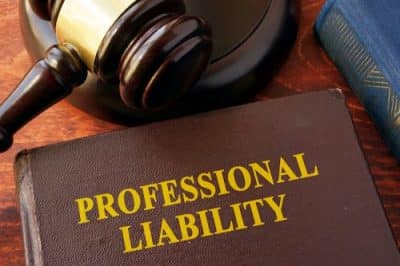Do you or your business offer professional services or advice to other companies or individuals? Could your advice or service cause your client to incur losses for which you could be held liable? If this is the case, you should consider purchasing professional liability insurance, often known as errors and omissions insurance (E&O).
Professional liability insurance covers claims that are not covered by general liability insurance, such as carelessness, misrepresentation, breach of good faith and fair dealing, and erroneous advice. Read on to learn more about professional liability insurance coverages, cost, and best companies.
What is Professional Liability Insurance?
Professional liability insurance protects business professionals such as attorneys, consultants, and accountants from claims of carelessness or misconduct in connection with the services they perform. It is also known as errors and omissions (E&O) insurance or professional indemnity insurance in some countries.
Even if you are an expert in your business, mistakes do occur. In addition, if your client or customer believes that a mistake in your professional services resulted in a financial loss, they have the right to sue you. Professional liability insurance protects you and your business if you make a mistake while providing professional services.
Professional liability coverage is often required for experts in a certain sector since their services can result in errors that cause financial or indirect harm to their clients. These kinds of accidents are often excluded from other sorts of commercial insurance businesses.
What are the Different Sorts of Firms that Require Professional Liability Insurance?
Professional liability insurance is needed in several states, particularly for attorneys and doctors. Legal and medical malpractice insurance policies are subsets of professional liability insurance. Professional liability insurance is also recommended for the following professionals:
- Accountants
- Architects
- Engineers
- Graphics Designers
- Information Technology Consultants
- Insurance Experts
- Investments Advisors
- Management Advisors
- Real Estate Brokers and Agents
- Software Developers
This is not an exhaustive list. To find out if you need professional liability insurance, talk to your insurance agent or the trade association for your field.
What Is Professional Liability Insurance Covered For?
Professional liability insurance can assist cover the following claims:
- Negligence
- Misrepresentation
- Incorrect advice
Even if you did nothing wrong, your client may sue your business if they believe you made a mistake. You will have to pay for hefty legal defense costs out of pocket if you do not have coverage.
It is critical to understand that professional liability insurance does not cover everything. It will not benefit your business, for example, if you make the following claims:
- Body injury or property damage: You should obtain a general liability insurance policy to help pay your costs if someone is injured on your business premises or you damage someone else’s property.
- Work-related injuries or illnesses: If your employees are injured or sick on the job, you’ll need a workers’ compensation insurance policy to help them heal and return to work.
- Data breach: If your business loses confidential or sensitive information about its clients or consumers, you’ll require cyber insurance.
Professional liability insurance can benefit your company if:
- Your accounting business makes a clerical error that costs your customer thousands of dollars.
- After you failed to deliver flowers in time for their wedding, a client sued your florist shop for errors in your services.
- Your real estate company recently sold a townhouse to a couple who planned to open a daycare. However, when the couple moved there, the townhouse association notified them that they were not permitted to operate a business on the property. The new residents have chosen to sue you for negligence.
How Does Professional Liability Insurance Work?
Professional liability insurance may go by several titles depending on the profession, such as medical malpractice insurance for doctors and errors and omissions insurance for real estate agents. Professional liability insurance is a specialized coverage that is not available through homeowners’ endorsements, in-home business policies, or business-owners policies. It only covers claims made during the term of the policy.
Professional liability insurance policies are typically structured on a claims-made basis, which means that coverage is only available for claims made during the policy period. Typical professional liability policies will indemnify the insured against loss arising from any claim or claims made during the policy period as a result of any covered error, omission, or negligent act performed during the policy period in the performance of the insured’s professional business. Incidents that occurred before the activation of the coverage may not be covered, though certain policies may have a retroactive date.
Can Professional Liability Insurance Cover Damages Caused by the Coronavirus (COVID-19)?
When a client sues you for poor work performance, professional liability insurance protects your business. That is, it may give coverage if a client sues you because you were unable to complete a job or missed a deadline owing to the coronavirus.
Keep in mind that many commercial insurance policies exclude coverage for communicable diseases. If you believe you are eligible for a claim, contact the claims department of your insurance carrier.
Is Professional Liability Insurance Required for Your Small Business?
Professional liability insurance is intended for firms that rely on their knowledge to make a living.
Even the most knowledgeable and meticulous professional service provider makes errors. Clients, on the other hand, may not be so understanding if your error costs them a significant amount of time or money.
It protects you against dissatisfied clients. For example, if you fail to meet a project deadline, make an omission in your work, or provide inefficient business advice, your customer may sue you.
If you are served with this type of litigation, your professional liability insurance policy will cover the costs of legal defense up to the policy level.
Who needs a Professional Liability Insurance?
Many different sorts of businesses require this insurance. This form of business insurance is required in several states. In other cases, business owners choose to obtain coverage in the event that a client or customer sues them.
If you do any of the following, you should obtain professional liability insurance:
- You must sign a contract requiring you to carry coverage.
- Customers can obtain professional services straight from you.
- Give your clients guidance on a regular basis.
Do Some Clients Expect you to Have Professional Liability Insurance?
Clients may obtain a certificate of insurance as verification of coverage. They want to know that if you don’t match their expectations, they can reclaim their losses.
Maintaining your professional liability coverage provides you with the same level of assurance.
Many of the policies are written with a “claims-made” exclusion and a retroactive date. This means that your professional liability policy must be valid in order for you to collect your insurance benefits:
- When an apparent error happens and
- When the claim is submitted
A claims-made professional liability policy provides coverage only if you file a claim within the policy period. If you don’t want to pay for litigation out of cash, you must have continuous coverage.
What Doesn’t Professional Liability Insurance Cover?
Coverage does not encompass criminal prosecution or all forms of civil legal liability, just those specified in the policy. Cyber liability, which covers data breaches and other technological hazards, may or may not be covered by basic policies. However, insurance that covers data security and other risks connected to technology security is offered as a separate policy.
Wording for a Professional Liability Policy
Some professional liability policies are more stringently worded than others. While some policy wordings are designed to meet a specified minimum acceptable wording, making them easier to compare, others differ significantly in the coverages they give. For example, if the occurrence occurred and was reported to the insurer by the policyholder during the policy period, breach of duty may be included.
Wordings with significant legal variances can be perplexing to non-lawyers. Coverage for “negligent conduct, error, or omission,” for example, indemnifies the policyholder for losses/circumstances sustained solely as a result of any professional error or omission, or negligent act (i.e., the modifier “negligent” does not apply to all three categories, though any non-legal reader might assume that it did). A “negligent act, negligent error, or negligent omission” provision, on the other hand, is a considerably more stringent policy that would exclude coverage in a case asserting a non-negligent error or omission.
Professional Liability Insurance Example
A common example of professional liability insurance is medical malpractice insurance. Medical professionals work under the looming danger of being sued for alleged medical malpractice, which is defined as an act or omission by a medical provider in which they deliver treatment that falls below the standard of care, resulting in injury or death to the patient. While most medical malpractice cases in the United States are considered civil torts, medical malpractice insurance can help providers cover the costs of such litigation.
What Is the Cost of Professional Liability Insurance?
Your professional liability insurance premium is unique to your business. The following factors can have an impact on the cost of your errors and omissions insurance:
- Policy specifics, such as coverage restrictions
- Business type
- Location
- The size of the business, the number of employees, and the number of clients
- Years of experience in business
- History of Claims
When you’re ready to acquire a quote, have crucial business documentation on hand, such as:
- Contract replicas
- Procedures for Documentation
- Any past errors and omissions coverage information
- Processes for quality control
- Initiatives for employee training
How much does Professional Liability Insurance Typically Cost?
Regardless of insurance policy limitations, the average monthly cost of professional liability insurance for a small business is $59 ($713 yearly). Because it excludes outlier high and low rates, the median cost provides a more accurate estimate of what your business is likely to pay than the average cost of business insurance.
The majority of small business owners (51 percent) pay between $500 and $1,000 per year for their policies, with 18 percent paying less than $500. These data are based on an examination of thousands of insurance policies purchased by Insureon small business customers.
What Factors Influence the Cost of Professional Liability Insurance in your Industry?
Because various professionals are exposed to different risks, the nature of your business and the industry in which you work have a considerable impact on the cost of professional liability insurance. Greater-risk businesses pay higher premiums on average, while low-risk ones pay lower rates.
A building design business, for example, often pays greater rates than an accounting business since a construction error might result in both bodily harm and financial loss. Those working in media and advertising are also paid well because the work of an advertising firm directly affects a client’s bottom line.
What Effect do Coverage Restrictions have on Professional Liability Insurance Cost?
If you want a professional liability insurance policy that pays out more per event or per year, you’ll need to increase your coverage amount – which means paying a greater premium to your insurance carrier.
Professional liability policies include a wide range of coverage, ranging from $250,000 to $2 million. The majority of Insureon clients (61%) buy a $1 million / $1 million professional liability policy. This includes the following:
- The per-occurrence maximum is $1 million. The insurer will pay up to $1 million for any single claim while the policy is in effect.
- The total limit is $1 million. The insurer will pay up to $1 million to cover all claims during the policy’s lifespan (often one year).
Tips for Lowering the Cost of Professional Liability Insurance
#1. Pay your complete premium in advance.
You have the option of paying your insurance premiums monthly or annually. While making smaller monthly payments saves money upfront, it may cost more in the long term because insurers frequently offer discounts to organizations that pay an annual premium.
#2. Maintain constant coverage.
While it is possible to obtain coverage before you begin a project and then cancel coverage when the project is completed, this cost-cutting tactic can backfire. Your “claims-made” professional liability policy must be current in order to collect insurance benefits:
- When an alleged error occurs
- When the claim is submitted
If you do not want to pay for professional liability cases cost out of pocket, you must have continuous coverage.
Professional Liability Insurance Protects Various Professionals In Different Ways.
#1. Auditors and Accountants
Accountants’ and auditors’ professional liability insurance covers the costs of lawsuits based on accounting errors, data entry errors, miscalculations, or lost paperwork. Because the policy provides the client with indirect financial protection, some clients will want confirmation of insurance before agreeing to work with your organization.
#2. Architects
Architects are protected by professional liability insurance from charges that a building design did not match project specifications, was delivered late, or had errors. A clause in a client contract may mandate professional liability insurance coverage.
#3. Consultants
Consultant professional liability insurance provides financial compensation in the event of a lawsuit alleging poor counsel or erroneous estimates. Before agreeing to work with you, certain clients may need confirmation of professional liability insurance.
#4. Engineers
Engineers’ professional liability insurance protects them financially from litigation arising from conflicts such as cost overruns, delivery delays, and building material issues. For some projects, you may be required to present proof of professional liability insurance to a client, partner, or licensing board.
Is there a distinction between Professional Liability and Errors and Omissions Insurance?
The simple answer is no. For the same type of coverage, different sectors use different names. Professional liability insurance may also be referred to as errors and omissions (E&O) insurance, despite the fact that they are identical but for the name.
Errors and omissions insurance is most commonly utilized by insurance agents, real estate agents, tax preparers, and information technology specialists.
This policy is known as legal or medical malpractice insurance by lawyers and doctors. (While Insureon does not provide malpractice insurance estimates, our licensed agents are pleased to supply doctors and lawyers with other necessary insurance.)
What is the Difference Between Professional Liability Insurance and General Liability Insurance?
Both general liability and professional liability insurance protect against frequent small business liability claims, but they cover distinct sorts of cases.
Customers’ bodily injuries, property damage, and advertising injuries are all covered by general liability insurance. Professional liability insurance, on the other hand, covers any legal defense costs incurred when a client or customer suffers a financial loss as a result of your professional services or advice.
Companies that provide Professional Liability Insurance
Professional liability insurance is one of the most valuable policies of business insurance, but not all insurance providers are made equal. We began with a list of 17 carriers and carefully analyzed each one based on policy options, simplicity of use, industry specialty, pricing, and customer happiness to determine the best insurance companies.
The Top Professional Liability Insurance Ccompanies for 2021
- AIG is the best overall.
- Pogo Best for Independent Contractors and Freelancers
- The Doctor’s Company is the best option for medical and healthcare providers.
- Embroker is ideal for lawyers.
- Thimble Insurance is the best option for small businesses.
- Hiscox is the best for Realtors.
#1. AIG: Best Overall
AIG is the top overall professional liability insurance provider, offering a wide range of policy options for every industry, specialist coverages, and its unique ReputationGuard service.
Pros
- Provides professional liability insurance to persons in a variety of businesses.
- After a lawsuit, ReputationGuard coverage protects your brand’s identity.
- All of the usual business insurance products are available, as well as some unique policies.
Cons
- A quote must be obtained by contacting an agent.
- It does not provide general liability insurance policies.
AIG is the top overall professional liability insurance provider, according to our analysis. Aerospace, healthcare, hospitality, construction, transportation, education, and many other industries are served by the company. You can select from a wide range of coverages, including specialty alternatives that you won’t find anywhere else. Whatever occurs, an AIG professional liability policy will protect you.
Through AIG, you may acquire a policy that is particularly created for the errors that are most typical in your sector, with coverages tailored to robotics professionals, business leaders, and publishers, to mention a few.
Another advantage is its ReputationGuard coverage, which covers services such as crisis communications, media training, fast response, and social media management if your business is embroiled in a significant lawsuit. As part of the ReputationGuard service, you can also purchase income loss protection.
Although AIG provides a wide range of business insurance products, it does not provide the most fundamental one—general liability insurance. Accident and health insurance, cyber liability insurance, environmental insurance, mergers, and acquisitions insurance, and surety bonds are among the policies available.
You must contact an agent to obtain a quotation for AIG professional liability insurance. AIG processes claims via phone and email, and the claim reporting guide can help you discover the correct contact for your industry and policy type.
#2. Pogo: Best for Independent Contractors and Freelancers
Pogo’s insurance marketplace is tailored to freelancers and sole proprietors, and it will help you get dependable coverage at a reasonable price.
Pros
- Multiple quotations from many insurance carriers are provided through a single application.
- Pogo only works with freelancers, therefore the coverage is tailored to your specific risks.
- There are numerous additional types of business insurance policies available.
Cons
- There is no opportunity to obtain an instant rate quote online.
- Does not reveal which insurance companies it works with.
Pogo is a very young insurance company that functions primarily as an internet insurance marketplace. It’s our top pick for freelancers since the firm specializes in independent contractor coverage and knows the particular dangers that self-employed individuals confront.
When you complete the online application, Pogo will match you with multiple insurance carriers based on your coverage requirements.
When you complete the online application, Pogo will match you with multiple insurance companies that meet your coverage needs based on the sort of business you own, the size of your business, your income, and the structure of your business. An agent can also advise you on the appropriate quantity of coverage to safeguard your professional liabilities.
Pogo also offers general liability insurance, a business owner’s policy, workers’ compensation insurance, cyber liability insurance, business property insurance, business auto insurance, and inland marine coverage in addition to professional liability insurance.
If you operate as a freelancer, Pogo is a good option for professional liability insurance, but there are certain drawbacks to consider. For starters, the company does not specify which insurance providers it works with. To see your matches, you must first request a quote. After you submit the form, you must wait for a Pogo agent to contact you with your results.
#3. The Doctor’s company: Best for Medical and Healthcare Providers
Healthcare providers face expensive malpractice and negligence lawsuits, but a professional liability policy from The Doctor’s Company provides vital protection.
Pros
- Policies are specifically intended for medical doctors and healthcare workers.
- Coverage is available for a wide range of vocations and workplaces.
- There is coverage for individual practitioners, small practices, and huge health systems.
Cons
- The website is devoid of information on what the policies cover.
- To obtain a quote or apply for coverage, you must deal with an agent.
The Doctor’s Company is the largest medical malpractice insurance company in the country, and it is our top recommendation for professional liability insurance for healthcare employees. The company sells coverage to 80,000 people nationwide, including doctors, nurses, dentists, surgeons, and entire healthcare systems.
The Doctor’s Company’s E&O insurance policies provide a number of coverages that are not included in a normal malpractice insurance policy. However, the company does not provide much information on what its policies actually cover on its website.
Medical malpractice insurance, MediGuard coverage for Medicare/Medicaid claims, CyberGuard coverage for patient data theft, management liability insurance, health and disability insurance, employment practices liability insurance, property and general liability insurance, and workers’ compensation insurance are all available in addition to E&O insurance.
The Doctor’s Company’s rewards program, The Tribute Plan, is one of its distinguishing aspects. Every policyholder is eligible to participate in The Tribute Plan, which compensates healthcare personnel for being loyal customers and providing patient services.
One disadvantage of The Doctor’s Company is that you must work with an agent directly to obtain a quote or purchase coverage. There is an online form for requesting a quote, but you must wait for a representative to contact you before proceeding with the purchase.
#4. Embroker: Best for Lawyers
Embroker’s professional liability policies are created with lawyers in mind, so you can avoid becoming involved in litigation that takes you away from billable work.
Pros
- Embroker’s policies are designed exclusively for lawyers and those in the legal industry.
- Shop for policies online and create your own insurance bundle.
- From payments to claims, you may manage your coverage entirely online.
Cons
- Individuals outside of the legal profession are not eligible for coverage.
- Because it is a newer company, it lacks financial ratings and genuine consumer feedback.
Embroker’s professional liability insurance is the best alternative for lawyers on the market. If a client sues you for negligence, malpractice, misrepresentation, oversight errors, and other reasons, attorney professional liability insurance will pay for your legal defense.
We enjoy Embroker’s marketplace setup, which allows you to browse coverage and customize a policy to your exact needs. You can also customize your coverage limits and select a deductible that fits your budget. The best part is that you can apply online and receive coverage in as little as 10 minutes. Most types of coverage do not have a waiting period.
In addition to professional liability insurance, Embroker offers a wide range of other business coverages, such as business owner’s policies, commercial crime insurance, cyber liability and data breach insurance, key person insurance, fiduciary liability insurance, surety bonds, and workers’ compensation.
Another reason Embroker is the finest professional liability supplier for lawyers is the low cost of coverage. Embroker is digital insurance, which helps the company to keep its prices low. If you have any queries about your coverage, you may contact Embroker 24 hours a day, 7 days a week via phone, email, or live chat.
Embroker, the country’s first digital business insurance company, was created in 2015. In 2020, the company began selling professional liability insurance to lawyers.
#5. Thimble: Best for Small Businesses
Thimble Insurance provides professional liability insurance that is both affordable and adaptable, making it suitable for small firms with shifting coverage requirements.
Pros
- Coverage is provided for a range of term lengths.
- Policies start at $36 per month and go up from there.
- Thimble caters to a wide range of professionals, including those in specialized fields.
Cons
- Not accessible in all states
- Doesn’t back up online claims
Thimble Insurance is the best option for small business professional liability insurance. The coverage is reasonably priced, you can select how frequently you want to pay, and the application procedure is quick and simple. You may easily alter your coverage as your company grows by using the online customer portal.
Thimble offers professional liability insurance to persons in a variety of occupations, including pet sitters, freelancers, event planners, beauty experts, janitors, fitness professionals, and others.
Thimble’s flexibility in policy terms and payment alternatives is one of its strongest qualities. You can purchase annual coverage or insurance for particular projects that last only a few days or weeks, so you don’t pay for coverage you don’t need.
Thimble’s professional liability insurance policies start at $36 per month, and you can pay your payment monthly instead of in one big sum.
Thimble also sells general liability insurance, equipment insurance, business owner’s policies, workers’ compensation insurance, malpractice insurance, and even hard-to-find policies such as drone insurance and event insurance.
One of the most significant issues for Thimble is that the company does not support internet claims. You must contact an agent if you need to file a claim. Furthermore, the company does not sell coverage in the states of Washington, New York, Colorado, Illinois, or Massachusetts.
#6. Hiscox: Best for Realtors
Hiscox, which offers specialized coverage and global protection to real estate agents and brokers, can provide dependable professional liability insurance.
Pros
- Coverage is tailored to realtors and the special risks associated with working with purchasers.
- Policies provide coverage everywhere in the world.
- Payment plans that are flexible and do not incur additional expenses are available.
Cons
- The National Association of Insurance Commissioners has received a large number of client complaints (NAIC)
- Customer service is solely provided over the phone.
We propose Hiscox to real estate agents, property managers, and brokers who need professional liability insurance to protect themselves from lawsuits with buyers and sellers. You can qualify for coverage via Hiscox whether you manage a small real estate agency with several agents or sell houses on your own as a side venture.
Hiscox professional liability insurance policies offer flexible payment alternatives. You can pay your annual payment in full or in monthly installments, with no additional expenses.
The coverage is tailored to the dangers that realtors face, and if you ever need to file a claim, Hiscox will assign a dedicated claims specialist to defend you. Furthermore, your coverage is applicable everywhere in the world, which is great for real estate professionals who sell properties in multiple countries.
Hiscox offers a variety of other business insurance policies to realtors, including business owner’s policies, general liability insurance, cyber security insurance, workers’ compensation, commercial auto insurance, umbrella insurance, directors and officers insurance, and employment practices liability insurance.
Hiscox is one of the country’s oldest business insurance carriers. It was established in 1905 and now has over 400,000 customers. Hiscox typically serves small businesses, however, coverage is accessible to firms of all sizes and across a wide range of industries.
How does the aggregate limit impact a professional liability insurance policy?
The aggregate limit is the maximum amount that an insurance company will pay out in total for all claims made during the policy period. Once the aggregate limit is reached, the policy will no longer provide coverage for additional claims, even if the policy period has not yet ended. It is important for professionals to understand their aggregate limit and consider the potential impact on their coverage in the event of multiple claims.
What is the policy limit for professional liability insurance?
The policy limit is the maximum amount that an insurance company will pay out for each individual claim made under the policy. The policy limit is specified in the insurance contract and is the maximum amount of coverage available for each claim. The policy limit is a crucial component of professional liability insurance and should be considered when choosing a policy.
What is the retroactive date for a professional liability insurance policy?
The retroactive date is the earliest date for which coverage is provided under a professional liability insurance policy. The retroactive date is specified in the insurance contract and is typically the date on which the policy is first purchased or the date on which an individual begins providing professional services. It is important to understand the retroactive date when purchasing a professional liability insurance policy, as claims made prior to the retroactive date will not be covered.
How does the retroactive date impact a professional liability insurance policy?
A professional liability insurance policy may be affected in various ways by the retroactive date. An insurance policy will not pay for any claims that arise from work done before the retroactive date. A policy with a more recent retroactive date may cost more than one with an older retroactive date because of the increased risk of a claim. When shopping for a professional liability insurance policy, think carefully about the retroactive date and select one that works for you.
What is the deductible for professional liability insurance?
A person’s out-of-pocket cost, before their insurance kicks in, is known as their deductible. The insurance policy itself will outline the deductible, which may or may not be different from policy to policy and person to person.
Professional Liability Insurance FAQs
What are the types of professional liability insurance?
Professional liability insurance includes errors and omissions insurance, medical malpractice insurance, and legal malpractice insurance.
Do contractors need professional liability insurance?
Contractors require public liability insurance because it can give financial protection in the event of bodily harm or property damage to a third party. As a contractor, it is critical to obtain public liability insurance to protect yourself against claims based on negligence.
What is the difference between professional liability and general liability?
The primary distinction between general liability and professional liability is the types of risks each covers. General liability insurance protects against physical hazards such as bodily harm and property damage. Professional liability insurance protects against more abstract risks, such as errors and omissions in the services your business delivers.
Do I need to get a professional indemnity insurance?
Professional Indemnity insurance protects your business from third-party claims that your professional services or advice caused them to lose money. Even if PI insurance is not required for your profession, your clients may.






